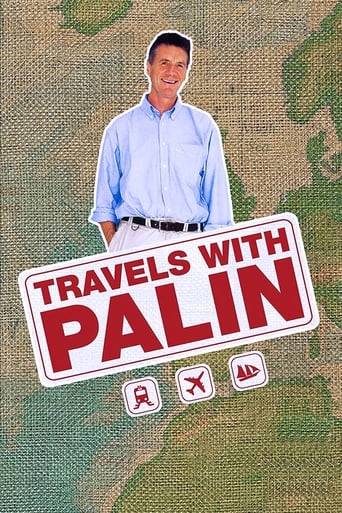Travels with Palin Season 6

"From what I gather, people feel they are doing a journey with me. They like following someone who is relatively inexpert, who likes to travel but is by no means an authority."
Watch NowWith 30 Day Free Trial!
Travels with Palin
1980
"From what I gather, people feel they are doing a journey with me. They like following someone who is relatively inexpert, who likes to travel but is by no means an authority."
Watch Trailer
Travels with Palin Season 6 Full Episode Guide
This episode starts with Palin crossing the border from Niger to Algeria, a desolate border with nothing but sand. A bit north of here are the Hoggar Mountains. At Assekrem he gets up early to view the sunrise from 9000' (3000 m). Next he boards an Algerian passenger plane and flies north to Hassi-Messaoud, an oil extraction and refining town; a man-made luxury oasis in the middle of the desert. From here the trip jumps to Libya, normally closed to western TV crews. To gain entry Michael Palin and his team have joined up with a British veteran's tour, and he mingles with the 80-year-old former "Desert Rats" who reminisce about the Battle of Tobruk. He also visits Benghazi and the ruins of Apollonia, once a Greek port, and the ruins of Leptis Magna, once a Roman city. Leaving Libya, Palin arrives in Tunisia.
Michael Palin did make it to the mysterious Timbuktu, and this episode opens with views of the famous mosque built of mud. Palin talks to the imam, who shows Palin documents indicating that Muslim scholars had discovered that the Earth circled the Sun at least 100 years before Europeans figured it out. After this Palin joins a tribe of Wodaabe nomads on their way to Ingal (in Niger) to participate in the Cure Salée festival. He talks to a young Wodaabe man named Doulla and to Céline, a young French woman who is also following along with the group. The subject of polygamy is again raised, and we see the unusual courting rituals of the Wodaabe. Here the young girls choose the man they would like to try out, while the young men stand in a line dancing and rolling their eyes and looking very feminine (by Western standards) with lots of makeup. At Tabelot Palin visits an oasis, where a camel is used to raise water from a deep well using a long rope and a goatskin bucket.
The episode starts with Palin crossing the Sénégal River, leaving Mauritania and entering the town of Saint-Louis in Senegal. He has left Arab Africa and entered Black Africa, and the French influence, from the colonial past, is strongly felt here. He interviews the artist Jacob Yakouba and his soap-opera-star wife Marie-Madeleine, talking to them about polygamy, which is prevalent here. Palin also visits Gorée Island, the main departure point for black slaves sold to America. Palin moves on to Dakar and watches (and takes part in) a late-night wrestling match, and then talks to the owner of a jazz café. Then he takes the Bamako Express train to Bamako in Mali, talking to a native woman about polygamy along the way. In Bamako he talks to the musician Toumani Diabate. Palin visits the town of Tirelli on the Bandiagara Escarpment where the Dogon people live.
The programme starts in Gibraltar, shown to be a bit of Britain only a few miles from Africa. In Tangier, Morocco, Palin rides a camel on the beach, and then plays football with some youths and hurts himself. He's somewhat revived by visiting a hammam, a public bath house. He attends a church service at St. Andrews Anglican Church together with some Nigerians who are trying to gain access to Europe. He also visits Jonathan, an expatriate Englishman, and his pet cockerel Birdie. To get to the Sahara it is necessary to travel over the Atlas Mountains. Along the way Palin visits Fez and sees the old-fashioned way to dye leather. Then in Marrakesh he visits the souk (market). In the mountains near Marrakesh Palin visits a Berber village, experiencing a "courtship dance". Before leaving the mountains he passes through Ait Benhaddou, an old town used as the location for many movies.
Free Trial Channels
Seasons


























